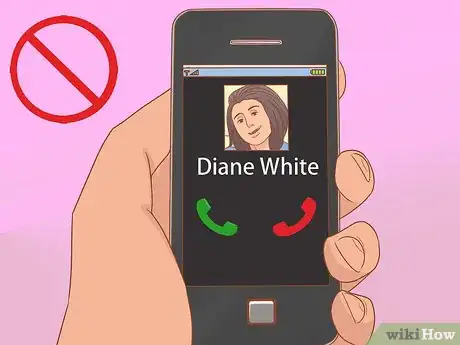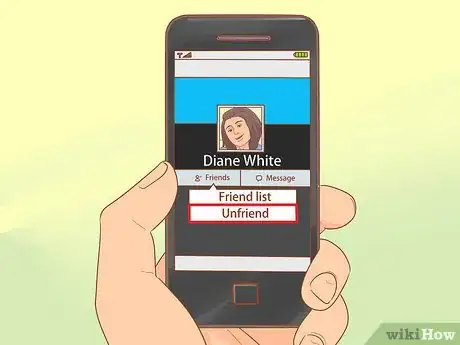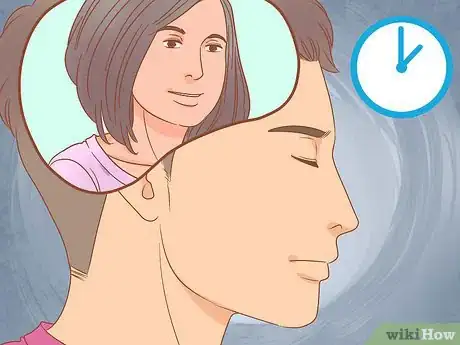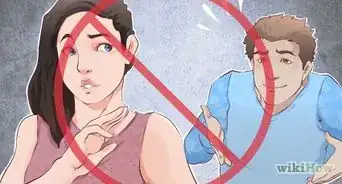This article was co-authored by Sarah Schewitz, PsyD. Sarah Schewitz, Psy.D. is a licensed clinical psychologist by the California Board of Psychology with over 10 years of experience. She received her Psy.D. from the Florida Institute of Technology in 2011. She is the founder of Couples Learn, an online psychology practice helping couples and individuals improve and change their patterns in love and relationships.
There are 10 references cited in this article, which can be found at the bottom of the page.
This article has been viewed 26,329 times.
If you’re having a hard time getting over your ex, you’re not alone. Everyone experiences heartache at some point. Unfortunately, social media and smartphones can make moving on from past relationships feel impossible. Don’t feel discouraged! With a little diligence and discipline, you can stop scrolling through your ex’s social media pages, manage obsessive thoughts, stop the urge to check up on your ex, and get past the breakup once and for all.
Steps
Getting Over Your Ex
-
1Cut off all contact with your ex. If you’re still in touch with them, stop calling, texting, or seeing them in person. If possible, avoid situations in which you’re likely to run into each other, and resist the urge to intentionally cross paths with them.[1]
- If you work or go to school together, do your best to focus on your task at hand or an absorbing thought. You may not be able to forget that they’re nearby, but you should try to keep yourself distracted as much as possible.
Warning: Constantly checking your ex’s social media is one thing, but following them, showing up at their work or school, threatening them, damaging their property, or persisting to contact them against their will is illegal, unhealthy behavior.
-
2Hide them on your phone and social media feeds. Either delete their number or label their entry in your contacts something like “Do not call or text” or “Exhibit self control.” As for social media, unfollow them, use the “Take a break” or similar settings to hide them from your feeds, or consider unfriending or blocking them.[2]
- In some cases, blocking them altogether may not be the best solution.[3] The more you try to put something out of your mind, the more likely you are to think about it. Checking their social media feed in controlled sessions may help you gradually overcome the urge to stalk.
Advertisement -
3Allow yourself to grieve, but come to terms with the breakup. It’s okay to cry, feel depressed, and take a day to sit on the sofa and mourn, especially if the breakup happened recently.[4] Everyone processes grief differently, so there isn’t an exact, universal mourning period.[5]
- That said, as time goes by, you should start to gradually accept the breakup. It may take a few months, and you may have bad days or experience ebbs and flows.
- As much as it hurts, remind yourself throughout the process that you will heal, you deserve to move on, and remaining stuck in the past isn’t worth your energy.
-
4Take up a new hobby. Staying busy can help you get past grief and anger, as well as offer a distraction from obsessive thoughts and the urge to see what they're doing. Think of an activity that you’ve wanted to try for a while but haven’t had the time. Fitness-related, outdoor, and group activities are all good options, as they can help you stay active and social.[6]
- For instance, sign up for a gardening or yoga class, take up rock climbing, or join a local sports league.
- Pursuing new hobbies and goals also helps promote self-compassion. Sometimes, stalking and obsessive thoughts are a response to feeling down about yourself. Learning new skills, meeting new people, and achieving new goals can help boost your self-esteem.[7]
-
5Try going on casual dates. When you feel comfortable with putting yourself out there, consider casually dating. Sign up for a dating app, or ask someone from your new activity or class to grab a coffee. Don’t rush into a new relationship while you’re still healing, but focus on having fun, getting to know the other person, and learning more about yourself in the process.[8]
- Lighthearted, casual dates can help remind you that there are other fish in the sea. Staying hooked on your ex is counterproductive, and your happiness is worth more than dwelling on the past.
Redirecting Obsessive Thoughts
-
1Allow yourself to think about your ex at scheduled, limited times. Set aside a specific window of time, such as Tuesday from 7:00 to 7:30 p.m., to give yourself permission to obsess over your ex, grieve, or feel angry. If you absolutely can’t resist the urge to stalk their social media profiles, do it during the designated obsession session.[9]
- Set an alarm and stop obsessing, grieving, or stalking at 7:30 on the dot. Aim to shorten your designated window by 5 or 10 minutes each week.
- Eventually, try going 10 days in between windows, then 2 weeks, and so on until you no longer need designated obsession sessions.
- You’ll probably have a hard time if you try to stop thinking about your ex altogether. Instead, gradually train yourself to move past your obsessive thoughts and urges to stalk.
-
2Think about or do something distracting when you start obsessing. When you feel obsessive during the weaning process, distract yourself and delay the urge until your designated session. Pick an image, thought, mantra, or action that can keep you busy until the obsessive thoughts pass.[10]
- For instance, think of a fire truck with a blaring siren warning you to get your mind off of your ex.
- Say or think to yourself, “I’m not going to think about that until next Tuesday.”
- Try doing an absorbing activity, like drawing, cooking, listening to upbeat music, or exercising.
-
3Identify situations in which you feel urges to stalk or obsess. Notice when you feel the strongest obsessive urges. Avoid the trigger if possible, or try to anticipate triggering situations and be prepared to redirect yourself.[11]
- For instance, if you find it hard to resist urges to stalk your ex on social media when you drink alcohol, avoid drinking.
- If you start thinking about them when you’re home alone, make a list of chores and activities that can keep your mind occupied.
-
4Try meditating daily to strengthen your mental control. Sit in a quiet, distraction-free place and wear loose, comfortable clothes. Breathe in deeply as you count to 4, hold your breath as you count to 7, then exhale for an 8 count. As you control your breathing, clear your mind and focus your thoughts solely on your breath.[12]
- Try visualizing a starry sky, and imagine that each star is a thought. Picture the stars fading away until just the one that represents your breathing remains. Focus on that star, and try to maintain a clear mind for 20 minutes.
Tip: It’s okay if your mind wanders or thoughts bubble up, especially at first. Don’t get frustrated; just acknowledge the thought, see it as a star, and visualize it fading away into the night sky.
Seeking Out Support
-
1Spend quality time with family and friends. If you’re grieving, closing yourself off from your family and friends may seem easy, and reaching out may feel like too much effort. However, isolating yourself will make matters worse. You deserve to have strong bonds with people who care about you, so nurture your relationships and spend time with loved ones.[13]
- When you hang out with family and friends, you don’t need to talk about your ex or your obsessive feelings if it makes you uncomfortable. By all means, vent if you need to, or just do a fun activity together to get your mind off of things.
-
2Phone a friend when you start obsessing or feel the urge to stalk. In addition to spending time with loved ones in general, lean on your support system when you need help in the moment. If you feel obsessive thoughts percolating, call a trusted friend or relative to redirect yourself.[14]
- Say, “Hey, I’m not doing so well right now, can we grab a coffee?” or “I need to get my mind off of things. Do you have time for a chat?”
- Again, you don’t have to talk about your ex, obsessive thoughts, or urges to stalk. Get it off of your chest and vent if you need to, or just shoot the breeze with your bestie to change your frame of mind.
-
3See a therapist if you have trouble managing obsessive thoughts. If obsessive thoughts persist and affect your quality of life, reach out to a mental health professional. They can help you develop techniques to tame obsessive thoughts and feelings.[15]
- Sometimes, stalking and obsessive behavior is related to past traumas, insecurity, or mental illness. If necessary, an experienced mental health professional can help you work through the underlying causes of obsessive thoughts and behavior.[16]
Overcoming Stigma: Try not to feel afraid or embarrassed about seeing a mental health professional. Your well-being is important, and seeing a healthcare provider for a mental illness is no different than seeing one for a physical illness.[17]
Expert Q&A
-
QuestionHow do I fight the urge to stop stalking an ex?
 Sarah Schewitz, PsyDSarah Schewitz, Psy.D. is a licensed clinical psychologist by the California Board of Psychology with over 10 years of experience. She received her Psy.D. from the Florida Institute of Technology in 2011. She is the founder of Couples Learn, an online psychology practice helping couples and individuals improve and change their patterns in love and relationships.
Sarah Schewitz, PsyDSarah Schewitz, Psy.D. is a licensed clinical psychologist by the California Board of Psychology with over 10 years of experience. She received her Psy.D. from the Florida Institute of Technology in 2011. She is the founder of Couples Learn, an online psychology practice helping couples and individuals improve and change their patterns in love and relationships.
Licensed Psychologist It'll be a lot easier if you don't see them on your social media feeds. Block them if you need to get some space from them.
It'll be a lot easier if you don't see them on your social media feeds. Block them if you need to get some space from them.
Warnings
- Call emergency services or seek immediate medical attention if you’re concerned you may harm yourself or another person.⧼thumbs_response⧽
References
- ↑ https://www.psychologytoday.com/us/blog/meet-catch-and-keep/201602/is-why-its-crucial-get-over-your-ex
- ↑ https://www.psychologytoday.com/us/blog/love-digitally/201608/should-you-and-your-ex-still-be-facebook-friends
- ↑ Sarah Schewitz, PsyD. Licensed Clinical Psychologist. Expert Interview. 15 April 2019.
- ↑ Sarah Schewitz, PsyD. Licensed Clinical Psychologist. Expert Interview. 15 April 2019.
- ↑ https://www.psychologytoday.com/us/blog/beyond-the-psychology-major/201705/how-let-go-after-your-breakup
- ↑ https://www.psychologytoday.com/us/blog/beyond-the-psychology-major/201705/how-let-go-after-your-breakup
- ↑ https://www.psychologytoday.com/us/blog/meet-catch-and-keep/201602/is-why-its-crucial-get-over-your-ex
- ↑ https://www.psychologytoday.com/us/blog/meet-catch-and-keep/201602/is-why-its-crucial-get-over-your-ex
- ↑ https://www.apa.org/monitor/2011/10/unwanted-thoughts
- ↑ https://www.apa.org/monitor/2011/10/unwanted-thoughts
- ↑ https://www.psychologytoday.com/us/blog/the-mysteries-love/201610/how-stop-thinking-about-ex
- ↑ https://www.apa.org/monitor/2011/10/unwanted-thoughts
- ↑ https://goaskalice.columbia.edu/answered-questions/help-me-stop-stalking-ex-and-new-partner/
- ↑ https://www.psychologytoday.com/us/blog/the-mysteries-love/201610/how-stop-thinking-about-ex
- ↑ https://www.psychologytoday.com/us/blog/two-minute-shrink/201006/taming-obsessive-thoughts
- ↑ https://blogs.psychcentral.com/caregivers/2014/09/characteristics-of-the-stalker-know-what-to-look-for/
- ↑ http://www.health.gov.au/internet/publications/publishing.nsf/content/mental-pubs-w-whatmen-toc~mental-pubs-w-whatmen-myth
- ↑ https://www.apa.org/monitor/2011/10/unwanted-thoughts





































































